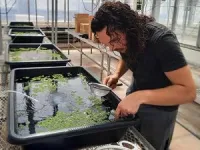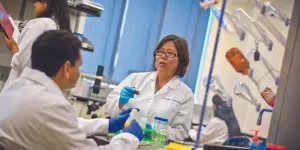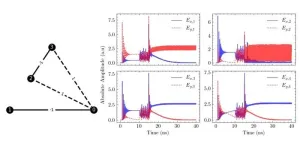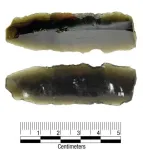(Press-News.org) Sir Peter was knighted for his contribution to IT and businesses in the Midlands in 2002
He will provide guidance, support, advocacy and strong links to industry in his role
The Institute will drive digital innovation and ensure digital inclusion.
Aston University is delighted to announce that it has appointed one of the UK’s most respected and successful business leaders, Sir Peter Rigby, as honorary chair of its new Digital Futures Institute.
The announcement of Sir Peter’s appointment was made in front of guests at the inaugural lecture given by Professor Abdul Sadka, director of the Digital Futures Institute, at Aston University on 22 February.
Sir Peter founded SCC – the largest privately owned Information Technology Group in Europe – some 50 years ago in 1975. SCC is the core business focus of the Rigby Group which ranks highly in the UK’s top privately owned businesses and its non-core interests extend beyond technology, transformation and technology investments into real estate, airports and hotels. Aston University and SCC signed a Memorandum of Understanding in March 2023, forming a strategic partnership to drive digital innovation and digital inclusion.
The establishment of the Digital Futures Institute represents Aston University’s long-term commitment to digital innovation. Working at the interfaces between health, digital and technology, the Institute is focused on transformational impact and economic regeneration of the region, particularly through the development of a digital powerhouse in the Birmingham Innovation Quarter (B-IQ).
The appointment reflects Sir Peter’s achievements as a technology innovator, his passionate commitment to the development of digital skills and wider contributions to the region.
The Institute will be based on the main Aston University campus and will be officially opened in September 2024.
Professor Aleks Subic, Vice-Chancellor and Chief Executive of Aston University, said:
“We are delighted that Sir Peter has agreed to be the inaugural honorary chair of the Digital Futures Institute at Aston University. We share many common goals, including a determination to accelerate digital innovation and digital inclusion to benefit business and society. Sir Peter’s support, advocacy and insight will be a great asset to the new Institute.”
Sir Peter Rigby said:
“I accepted the position because I believe the work of the Institute will make an impact on some of the most important issues facing society – namely digital inclusion and socially responsible transformation – and particularly the application of AI and helping to accelerate AI backed products and services to market.
"There is strong synergy between Aston and SCC, and this formalised last year into a strategic partnership focused on driving the application and deployment of digital technologies and digital skills. The Digital Futures Institute is the focal point for this partnership.
"As Honorary Chair of the Institute, I hope to provide guidance, support and advocacy to ensure strong links to cutting-edge digital technologies in industry."
END
Sir Peter Rigby appointed as honorary chair of Aston University’s new Digital Futures Institute
2024-02-23
ELSE PRESS RELEASES FROM THIS DATE:
Yale School of Medicine receives a $575,000 grant from PolyBio Research Foundation to fund long COVID research
2024-02-23
Yale School of Medicine and its Center for Infection & Immunity (CII) are receiving a $575,000 grant from PolyBio Research Foundation to fund Long COVID research. The grant—issued via PolyBio’s LongCovid Research Consortium (LCRC)— will support a collaboration to define mechanisms by which the SARS-CoV-2 virus can persist for long periods of time in tissue and blood.
There is growing evidence that SARS-CoV-2 may not fully clear from Long COVID patients after initial infection. Instead, reservoirs of the virus can persist in patient tissue for months or even years, with recent research finding the SARS-CoV-2 ...
Common plant could help reduce food insecurity, researchers find
2024-02-23
UNIVERSITY PARK, Pa. — An often-overlooked water plant that can double its biomass in two days, capture nitrogen from the air — making it a valuable green fertilizer — and be fed to poultry and livestock could serve as life-saving food for humans in the event of a catastrophe or disaster, a new study led by Penn State researchers suggests.
Native to the eastern U.S., the plant, azolla caroliniana Willd — commonly known as Carolina azolla — also could ease food insecurity in the near future, according to findings ...
Innovative chemotherapy approach shows promise against lung cancer
2024-02-23
Lung cancer is not the most common form of cancer, but it is by far the deadliest.
Despite treatments such as surgery, radiation therapy and chemotherapy, only about a quarter of all people with the disease will live more than five years after diagnosis, and lung cancer kills more than 1.8 million people worldwide each year, according to the World Health Organization.
To improve the odds for patients with lung cancer, researchers from The University of Texas at Arlington and UT Southwestern Medical Center have pioneered a novel approach to deliver cancer-killing drugs directly into cancer cells.
“Our method ...
Encoding computers of the future
2024-02-23
In our data-driven era, solving complex problems efficiently is crucial. However, traditional computers often struggle with this task when dealing with a large number of interacting variables, leading to inefficiencies such as the von Neumann bottleneck. A new type of collective state computing has emerged to address this issue by mapping these optimization problems onto something called the Ising problem in magnetism.
Here's how it works: Imagine representing a problem as a graph, where nodes are connected by edges. Each node has two states, either +1 ...
Artifact could be linked to Spanish explorer Coronado's expedition across Texas Panhandle
2024-02-23
DALLAS (SMU) – It’s a small piece of obsidian, just over 5 centimeters long, likely found on a hard-scrabble piece of ranchland in the Texas panhandle. But when SMU anthropologist Matthew Boulanger looks at it, he gets a mental image of Spanish explorer Francisco Vasquez de Coronado making his way across the plains more than 470 years ago in search of a fabled city of gold.
Boulanger believes that the flaked-stone tool with its sharp edge was likely dropped by a member of Coronado’s ...
Do’s and don'ts with direct oral anticoagulants
2024-02-23
Direct oral anticoagulants (DOACs) are a common treatment for patients with a wide variety of cardiovascular conditions. DOACs are the preferred treatment over vitamin K antagonists (VKAs) for many patients with atrial fibrillation or venous thromboembolism, since the latter would have a higher risk of intracranial bleeding and more complex dosing routine. However, new research suggests that DOACs should not be the first line of treatment for every patient who need to treat or prevent blood clots. A systematic overview from researchers at Brigham and Women’s Hospital, a founding member of Mass General Brigham, discusses the efficacy ...
Super strong magnetic fields leave imprint on nuclear matter
2024-02-23
UPTON, NY—A new analysis by the STAR collaboration at the Relativistic Heavy Ion Collider (RHIC), a particle collider at the U.S. Department of Energy’s (DOE) Brookhaven National Laboratory, provides the first direct evidence of the imprint left by what may be the universe’s most powerful magnetic fields on “deconfined” nuclear matter. The evidence comes from measuring the way differently charged particles separate when emerging from collisions of atomic nuclei at this DOE Office of Science user ...
TMEM208 variants cause a new developmental disorder
2024-02-23
A recent study conducted in the lab of Dr. Hugo J. Bellen, distinguished service professor at Baylor College of Medicine and principal investigator at the Jan and Dan Duncan Neurological Research Institute at Texas Children’s Hospital, has discovered a biological role of a specific transmembrane protein called TMEM208.
The study, published in the Proceedings of the National Academy of Sciences, showed that a majority of fruit flies lacking this gene do not survive, and the few that do survive have many developmental defects. Similarly, a child with variants ...
Researchers explore whether gut microbes cause some COVID-19 patients to have higher blood clot risk
2024-02-23
A gut microbial metabolite called 2-methylbutyrylcarnitine (2MBC) plays a role in exacerbating thrombosis -- the formation of blood clots – researchers report February 23rd in the journal Cell Metabolism. The results also revealed that 2MBC is accumulated in individuals with COVID-19, potentially explaining why these patients are at increased risk of thrombosis.
“Our study provides mechanistic insight by implicating 2MBC as a metabolite that links gut microbiota dysbiosis to elevated thrombotic ...
Childhood factors associated with unnatural death through midadulthood
2024-02-23
About The Study: In this urban population-based cohort study of 2,180 participants, no modifiable risk factors of mortality at the level of the individual (e.g., depression or anxiety and substance use) or the family (e.g., household education level) were identified. However, the degree of neighborhood poverty in early childhood was significantly associated with death by unnatural causes (death due to unintentional injury, suicide, and homicide) in early adulthood, suggesting that economic policies are needed to advance health equity in relation to premature mortality.
Authors: Holly C. Wilcox, Ph.D., of the Johns Hopkins Bloomberg ...







